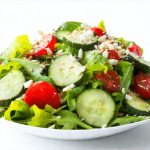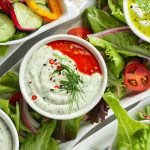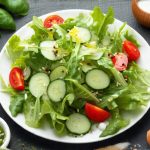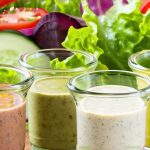Salads are often heralded as the epitome of healthy eating – vibrant, fresh, and packed with nutrients. We’re frequently encouraged to “eat more greens,” and for good reason; vegetables are undeniably beneficial for our overall well-being. However, many individuals find themselves experiencing uncomfortable digestive symptoms like cramping and bloating after consuming a large salad, leaving them questioning this seemingly healthy choice. This paradox often leads to frustration and confusion, as the very food intended to nourish can instead cause distress. It’s important to understand that discomfort isn’t necessarily an indication that salads are bad for you, but rather points towards complexities within our digestive systems and how they react to specific components of these meals, or even the sheer volume consumed.
The issue often arises from a combination of factors, ranging from the types of vegetables used to the way the salad is prepared and even individual sensitivities. It’s not simply about what you eat but how much and in what context. A sudden increase in fiber intake, for instance, can overwhelm the digestive system if it’s not accustomed to it. Similarly, certain raw vegetables are more difficult to digest than others. The addition of dressings, toppings, and even the order in which ingredients are combined can all play a role. Understanding these nuances is key to enjoying salads without unpleasant side effects and maximizing their health benefits. You might also find helpful tips on how to avoid bloating during celebratory times when dietary habits often change.
Fiber Overload & Digestive Response
Fiber is undoubtedly one of salad’s greatest strengths—and potentially its biggest challenge. While crucial for digestive health, regularity, and overall wellbeing, rapid increases in fiber intake can lead to bloating, gas, and cramping. This happens because our gut bacteria need time to adjust to processing larger quantities of fiber. They ferment it, which is a normal process producing gases as a byproduct. – A sudden influx overwhelms the system, resulting in noticeable discomfort. Different types of fiber also play a role: soluble fiber (found in oats, beans, and some fruits) absorbs water and forms a gel-like substance, slowing digestion; insoluble fiber (in whole grains, vegetables) adds bulk to stool and promotes quicker passage. A salad rich in both is great, but the sheer volume can be problematic if your body isn’t used to it.
The digestive system has limited capacity. When presented with a large amount of undigested food – particularly fiber – it struggles to break everything down efficiently. This leads to fermentation in the colon, producing gases like hydrogen, carbon dioxide, and methane, which cause bloating and cramping. It’s also why slowly increasing your fiber intake over several days or weeks is recommended; this allows your gut bacteria time to adapt and minimizes these unpleasant side effects. Consider starting with smaller portions of salad and gradually increasing the amount as tolerated. Understanding food temperature can also play a role in reducing digestive upset.
Furthermore, some individuals have sensitivities to certain types of fiber found in specific vegetables. For example, FODMAPs (Fermentable Oligosaccharides, Disaccharides, Monosaccharides And Polyols) are a group of carbohydrates that can cause digestive distress in susceptible people. Many salad ingredients – onions, garlic, apples, stone fruits – contain these compounds. While not everyone reacts to FODMAPs, those with Irritable Bowel Syndrome (IBS) or similar sensitivities may find their symptoms exacerbated by high-FODMAP salads.
Identifying Trigger Vegetables
Determining which specific vegetables might be contributing to your discomfort can require some detective work. Keeping a food diary is an excellent starting point. – Record everything you eat, including salad ingredients and portion sizes. – Note any accompanying symptoms (bloating, cramping, gas) and the timing of their onset. This will help identify potential trigger foods. Some vegetables are naturally more likely to cause digestive issues than others:
- Cruciferous Vegetables: Broccoli, cauliflower, cabbage, and Brussels sprouts contain raffinose, a complex sugar that can be difficult to digest, leading to increased gas production. Lightly steaming or cooking these vegetables can help break down the raffinose and make them easier on your system.
- Raw Leafy Greens: While incredibly nutritious, large amounts of raw leafy greens like kale and spinach can be challenging for some people to digest due to their high fiber content and cellulose structure. Massaging kale with a little oil or lemon juice before adding it to your salad can help soften the fibers and improve digestibility.
- Onions & Garlic: These alliums are rich in fructans, a type of FODMAP that can trigger symptoms in sensitive individuals. Using smaller amounts or opting for green onions (which contain lower levels of fructans) may be helpful.
It’s important to remember that everyone is different. What triggers discomfort in one person may not affect another. Experimenting with eliminating specific vegetables from your salad and observing the results can help pinpoint your personal trigger foods. Don’t eliminate entire food groups without considering professional guidance, as these vegetables offer significant nutritional benefits. If you suspect GERD might be a contributing factor, consider exploring GERD and bloating for more information.
The Role of Chewing & Digestion
Digestion actually begins in the mouth! Thorough chewing is essential for breaking down food into smaller particles and mixing it with saliva, which contains enzymes that start the digestive process. When we eat salads quickly or don’t chew properly, larger chunks of undigested food reach the intestines, increasing the workload for your gut bacteria and potentially leading to fermentation and bloating. – Take your time while eating. – Focus on chewing each bite thoroughly before swallowing.
The speed at which you consume a salad also matters. Eating quickly can overwhelm your digestive system, as it doesn’t have enough time to process the food efficiently. This is particularly true with high-fiber salads, where thorough breakdown and enzymatic action are crucial for optimal digestion. Slowing down allows your body to better prepare for the influx of fiber and reduces the likelihood of discomfort.
Consider pairing your salad with digestive enzymes if you consistently experience issues. These supplements can help break down complex carbohydrates and proteins, easing the burden on your digestive system. However, it’s vital to discuss enzyme supplementation with a healthcare professional before starting, as they may not be appropriate for everyone or could interact with certain medications. Supporting your gut microbiome is also key – learning about probiotics can provide valuable insight.
Hydration & Gut Health Connection
Adequate hydration is paramount for healthy digestion. Water helps soften stool and facilitates its passage through the intestines, preventing constipation which can exacerbate bloating and cramping. When you consume a high-fiber salad without drinking enough water, the fiber absorbs water from your body, potentially leading to dehydration and harder stools. – Drink plenty of water before, during, and after eating your salad.
Beyond simply staying hydrated, supporting overall gut health is crucial for minimizing digestive distress. A healthy gut microbiome – the community of bacteria living in your intestines – plays a vital role in digesting food, absorbing nutrients, and regulating inflammation. – Consume probiotic-rich foods like yogurt, kefir, or sauerkraut to support a diverse and balanced gut microbiome. – Consider incorporating prebiotic foods (onions, garlic, bananas) which feed beneficial gut bacteria. It’s also helpful to consider tracking gut health when making dietary changes.
Chronic stress can also negatively impact gut health, disrupting digestion and increasing susceptibility to bloating and cramping. Managing stress through techniques like meditation, yoga, or deep breathing exercises can promote a healthier digestive system. Remember that your emotional wellbeing is intricately linked to your physical health, particularly when it comes to digestion. If you’re experiencing altitude-related bloating, understanding high altitudes impact on gas can be helpful as well.


















